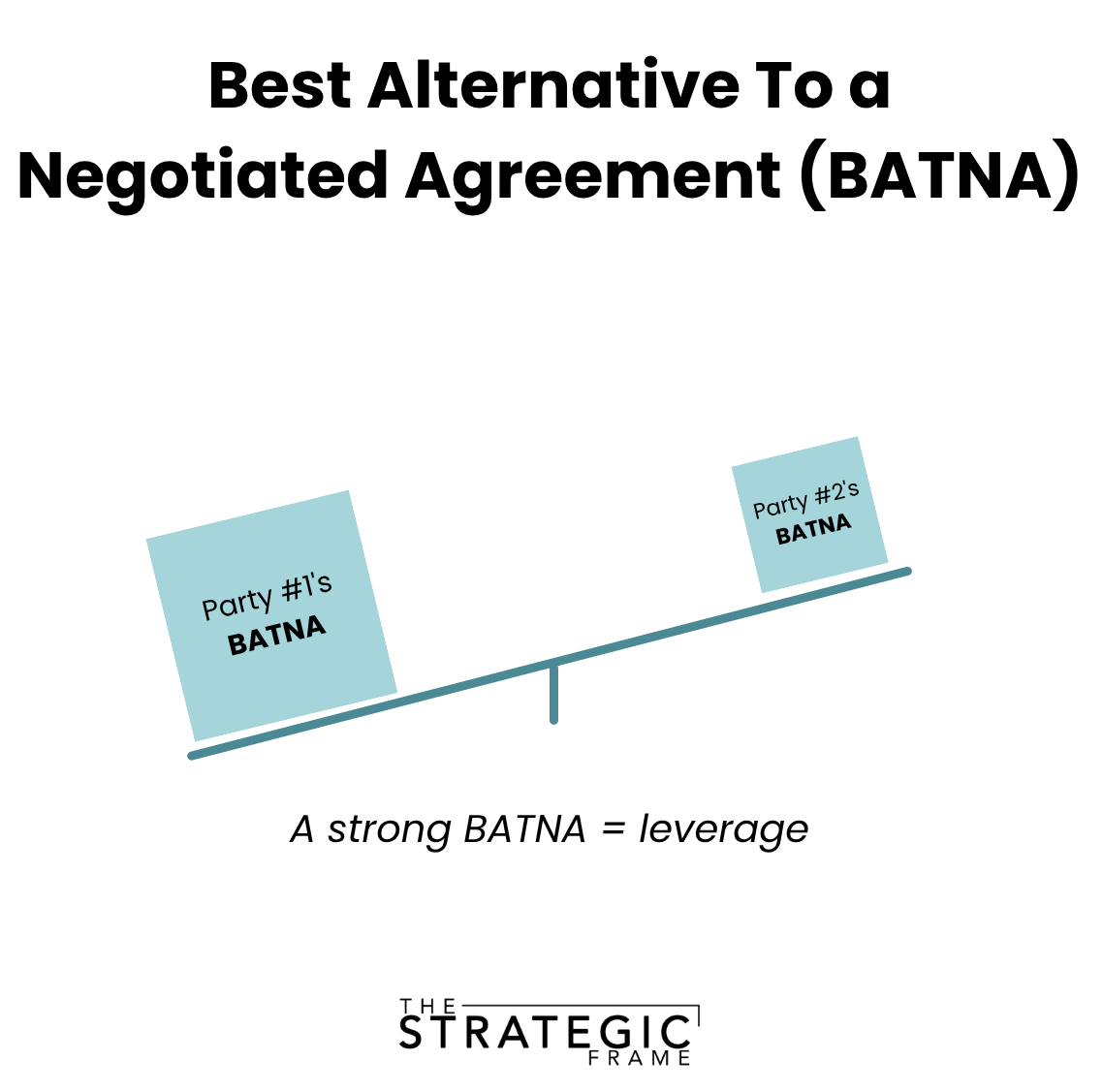BATNA in Negotiations
What’s Your Best Alternative To a Negotiated Agreement?
EXECUTIVE SUMMARY:
When win-win outcomes are not possible, the key to leverage lies in your alternatives. Your BATNA, or Best Alternative to a Negotiated Agreement, defines what you will do if a deal cannot be reached. A strong BATNA gives you confidence, clarity, and power by setting the minimum terms you are willing to accept and ensuring you never negotiate from a place of weakness. The stronger your BATNA, the better your results, often without ever needing to use it.
The past couple weeks, we covered Integrative Negotiations and the Shadow Negotiation with the premise that more often than we realize, it is possible to create win-win solutions that benefit all parties.
But let’s be real. That is the ideal scenario, not the universal one. Sometimes interests conflict. Sometimes resources are fixed. And sometimes, no matter how much empathy or creativity you bring to the table, the negotiation is purely distributive, meaning that one side’s gain comes at the other’s expense.
So how do you approach those situations strategically? How do you protect yourself and increase your leverage?
You build a strong BATNA.
What is a BATNA?
BATNA is an acronym for “Best Alternative to a Negotiated Agreement,” and it is exactly what it sounds like. It is the best option available to you if the current negotiation falls apart.
It answers the question: “What will I do if we cannot reach an agreement here?”
Knowing your BATNA gives you a clear standard for evaluating any offer. It sets a floor for what you are willing to accept and provides leverage because you have a credible alternative. If your BATNA is strong, you negotiate from a position of power. If it is weak or undefined, you risk accepting less than you deserve. The party with the stronger BATNA has the greater leverage.
For example, if you are negotiating a job offer and already have another offer in hand, your BATNA gives you confidence. If you are buying a car and have another dealership ready to sell you the same model for less, your BATNA strengthens your bargaining position.
Thinking through your BATNA is most helpful in short-term relationships or transactions, such as negotiating the price of an antique at a garage sale or in the aforementioned car buying process.
An Example of BATNA in Action
Imagine you are a small manufacturer negotiating a supply contract with a large retailer. The retailer pushes for lower prices and tighter payment terms. You feel pressured because they represent a big account.
If you have not developed your BATNA, you might concede just to keep the business. But if you have already explored other retailers, identified smaller but more profitable channels, or secured direct-to-consumer distribution options, you suddenly have leverage.
You can now say, truthfully, that you have alternatives. The retailer senses this and becomes more flexible on price and payment terms. Ironically, the stronger your BATNA, the less you often need to use it.
Why Your BATNA Matters
A strong BATNA provides three essential benefits:
Confidence: You can walk away if needed, which shifts the power dynamic.
Clarity: You know your minimum acceptable terms.
Leverage: The other party recognizes that you have options, which influences their behavior.
Without a clear BATNA, you are negotiating in the dark. With one, you are negotiating with purpose.
Tips for Strengthening Your BATNA
Identify all possible alternatives: List every viable option you have if this deal falls through.
Evaluate each alternative: Assess their feasibility, timing, and value objectively.
Improve your best option: Strengthen your top alternative so it becomes more attractive.
Know the other party’s BATNA: Understanding their fallback option helps you gauge their flexibility.
Avoid revealing too much: Share your alternatives only when it strengthens your position, not when it weakens it.
Wrapping It All Up
Great negotiators do not rely solely on persuasion. They prepare by knowing their walk-away point and building credible alternatives before they enter the room. Your BATNA is not just a backup plan, it is a tool. The stronger it is, the less desperate you are to close a deal, and the more likely you are to reach one that truly serves your interests.
What is your current BATNA in the negotiation you are facing? How can you strengthen it before you go to the negotiating table?
This email is sponsored by Workshop SLC
Workshop SLC is a creative art school and studio offering 200+ monthly classes in painting, drawing, ceramics, and mixed media — right in the heart of Salt Lake City. They aim to elevate the arts, supporting hobbyists and professionals alike with community and inspiration. Learn more at https://www.workshopslc.com/.



